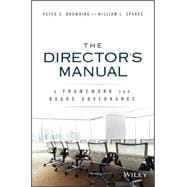The Director's Manual: A Framework for Board Governance offers current and aspiring board members essential up-to-date governance guidance that blends rigorous research-based information with the wisdom found only through practical, direct experience. The book's flexible approach to solving governance issues reflects the authors' belief that no two boards and the cultural dynamics that drive them are the same. As such, the advice offered reflects recognizable leadership dynamics and real world, relevant organizational situations.
The book's two authors, Peter C. Browning, an experienced CEO and member of numerous boards and William L. Sparks, a respected organizational researcher, combine their individual experiences and talents to create a book that is both innovative and applicable to directors in any industry sector. Specific best practice guidance is designed to help board members and their directors understand the unique strengths and challenges of their own board while at the same time provide targeted information that drives needed improvements in board performance and efficiency. Specifically, this book will help board members:
- Explore practical advice on key issues, including selection, meeting schedules, and director succession
- Consider board performance from multiple perspectives, including cultural and group dynamics
- Discover how to effectively manage classic problems that arise when making decisions as a group
- Access a comprehensive set of assessment questions to test and reinforce your knowledge
The Director's Manual: A Framework for Board Governance offers practical advice to guide you as you lead your organization's board.








